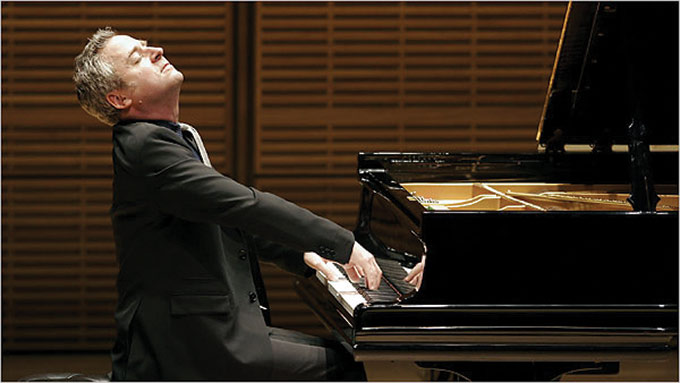UB Opens Spring Semester Concert Series with Pianist Jeremy Denk
by Jan Jezioro

Catch a Rising Star
The Department of Music at the University at Buffalo launches its varied spring semester concert season by featuring a mini-residency by the New York City-based pianist Jeremy Denk, who will appear in recital on Friday, January 21, at 7:30pm in Lippes Concert Hall in Slee Hall on UB’s Amherst campus. One of the more introspective pianists now touring, Jeremy Denk is no stranger to Buffalo classical music audiences, having previously appeared locally a couple of times on the Ramsi P. Tick subscription concert series: in 2005, accompanying violinist Joshua Bell, a frequent role for him, and as a soloist in 2008, in a recital that was highlighted by a memorably cohesive performance of Beethoven’s mighty Hammerklavier sonata.
For his UB recital Denk has chosen to perform a pair of provocatively mismatched but individually intriguing compositions: György Ligeti’s Études, Books I & II and the well known but seldom performed Goldberg Variations, BWV 988, by Johann Sebastian Bach. Denk recently played this program at UC Berkeley, and he will repeat it at Carnegie Hall.
György Ligeti (1923-2006) is generally recognized as the most important Hungarian composer in the second half of the 20th century. Initially trained in Hungarian conservatories, Ligeti fled the country after the brutal Soviet suppression of the 1956 revolution, eventually becoming an Austrian citizen. Ligeti studied in Cologne with Karlheinz Stockhausen, one of the most influential postwar German composers, a leader of the Darmstadt School and a pioneer in the field of electronic music. Ligeti compositions, like the 1961 Atmosphères, a densely textured work for full orchestra, and the 1966 Lux Aeterna, written for 16 solo singers, helped the composer find an international audience after their use in the soundtrack of Stanley Kubrick’s 1968 hit 2001, where they contributed immeasurably to the unearthly quality of the film.
After taking a hiatus in the late 1970s to develop a new stylistic voice, Ligeti emerged as a genuine force on the international music scene. Ligeti’s three books of 18 Études, composed between 1985 and 2001, follow in the tradition of similar piano studies by Chopin, Liszt, and Debussy, while addressing new, virtuoso technical problems inspired by the musical concepts that Ligeti had been evolving in his compositions since the 1950s. Ligeti’s Etudes are among the most inventive works recently composed for the piano, as different sound worlds are explored in each of these miniature pieces, from the devilishly complicated to the seemingly simple, mirroring the composer’s musical worldview. As Denk writes on his often amusing blog—jeremydenk.net—“the Etudes shimmer with coolness, both in the sense of restraint and the Hip. And then, they are also outrageous, over the top, demanding of the impossible, and engaging of the dance rhythm to the end of the mind’s range, an orgy of rhythmic complication.”
Consisting of an aria with 30 variations, Bach’s 1741 Goldberg Variations are named after the German harpsichord virtuoso Johann Gottlieb Goldberg, and the work displays many different compositional techniques, including the use of canon, fugue, and counterpoint. The story goes that the work was commissioned by Count Kaiserling, the Russian ambassador to the court of Saxony. According to an early biographer of Bach, Kaiserling, who suffered from chronic insomnia, asked the composer to write a work “which should be of such a smooth and somewhat lively character that he might be a little cheered up by them in his sleepless nights.” Denk has written of the Goldberg Variations that “the mishmash of reverence and irreverence is what really gets me off.” Writing of a performance of the Goldberg Variations by Denk at New York’s Symphony Space in 2009, the New York Times noted: “It was indeed a performance to treasure, riveting from the first notes of the gorgeous Aria. Mr. Denk’s unmannered, profound playing, enriched by multihued dynamics and vibrantly contrasting moods earned him universal approval from the rapturous audience.”
In addition to his Friday evening recital, Denk will also present a master class on Saturday morning, January 22, 10am-noon, in Room 250 of Baird Recital Hall, where he will coach four graduate level students from the UB Department of Music. The master class is open for public observation, free of charge.
Advance tickets are $12 general admission; $9 for UB faculty, staff, alumni, and senior citizens; $5 for students. At the door: $20, $15, and $8. For more information, visit www.slee.buffalo.edu.
blog comments powered by Disqus|
Issue Navigation> Issue Index > v10n2 (Week of Thursday, January 13th) > Classical Music Notes > UB Opens Spring Semester Concert Series with Pianist Jeremy Denk This Week's Issue • Artvoice Daily • Artvoice TV • Events Calendar • Classifieds |









 Current Issue
Current Issue